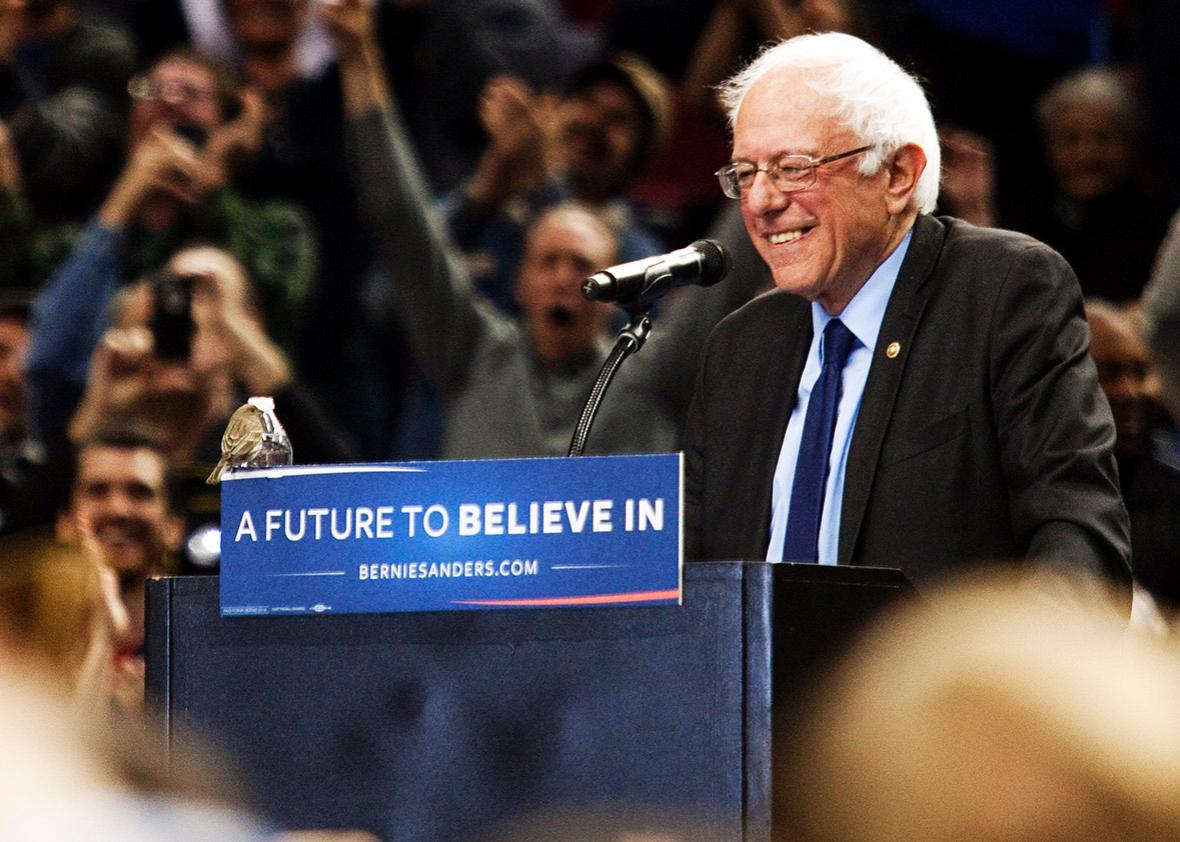After a very good weekend in which fortune fell upon Bernie Sanders like a bird alighting on a podium, you could be forgiven for thinking the Sanders campaign has momentum.
On Saturday, he won Washington state’s caucus with 72 percent of the vote. He won Hawaii’s with 70 percent of the vote. And he won Alaska’s with a whopping 82 percent of the vote. This follows victories in Idaho and Utah, where Sanders beat Hillary Clinton with 60-point margins. And if the past is any indication, the Sanders campaign will turn those wins into massive cash donations, fueling his efforts in Wisconsin (which votes next week), New York, and California.
Given his success, his fundraising, and the sheer enthusiasm for his campaign, it’s easy to look at the past week and believe that Sanders is on the cusp of a new dawn—that soon he’ll turn a corner toward victory. “Don’t let anybody tell you we can’t win the nomination or win the general election,” he told supporters. “We’re going to do both of those things.”
In a conference call with reporters on Monday, Sanders campaign manager Jeff Weaver echoed this point. “We have had overwhelming wins in six of the last primaries,” he said. “We are on the path to victory and there is a path to do so,” he continued, emphasizing the campaign’s strong fundraising. Likewise, said senior strategist Tad Devine, “Where we compete with [Clinton], we have a very good chance of beating her.”
Sanders’ victories are impressive, but to repeat myself, you don’t win the primary with states; you win it with delegates. And even after Saturday, Sanders trails behind Clinton in “pledged” delegates awarded through voting. Before Saturday, the former secretary of state led Sanders by 294 pledged delegates. After Saturday, she led by 259. With just under 2,000 pledged delegates left in the contest, Sanders needs 55 percent of remaining delegates to win a majority. If you add “superdelegates” (Democratic lawmakers and officials) to the total, then Sanders needs 66 percent of remaining delegates to score a majority.
What about his momentum? you say. Forward movement and the sense of impending victory is a powerful force for raising money and winning coverage. But barring something extraordinary, it doesn’t change the landscape. Sanders had tremendous momentum after his surprise win in Michigan, but it didn’t change the outcomes in Ohio, Missouri, Florida, North Carolina, and Illinois, where Clinton won—as largely expected—on the strength of her ties to black and Latino Democrats. In turn, this didn’t shift the outcome in either Idaho or Utah, contests where Sanders held the advantage. Not only does Sanders perform well in states like Washington, where the Democratic electorate is whiter than average; he also does best in caucuses, which reward the enthusiasm he generates in spades.
The next fight is in Wisconsin, where, momentum or not, it’s a pick ’em. With its colleges and universities and its long history of left-wing politics and labor organizing, Sanders is a natural fit for the state that rose in mass protest after Republican Gov. Scott Walker ended collective bargaining for public-sector employees. On the other side, Clinton is still strong with black voters, who constitute a significant portion of the state’s Democratic electorate. And if her performance in other Midwestern states is any indication, Clinton should do well with moderates as well as partisan Democrats.
After Wisconsin, the race takes on a familiar pattern. There are caucuses in Wyoming and North Dakota, where Sanders should do well. And there are primaries in New York, California, and New Jersey, where voters will allocate most of the remaining delegates. These states have larger than average black and Latino populations, which is to say that—like Florida and Illinois—they look like Clinton territory. If Sanders has had an impressive run of wins in the last two weeks of March, Clinton will likely have a similar run in April and May. The difference is that it will deliver a critical burst of delegates, further padding her margin over Sanders.
None of this is to dismiss Sanders or his support. But at this stage, the primary is static. There are states that favor Sanders, and there are states that favor Clinton. The latter hold more pledged delegates than the former. After Nevada, the Sanders campaign pursued a “state-win strategy,” designed to score as many states as possible. But they didn’t need states; they needed delegates. Now, they face a hill that’s almost too steep to climb.
